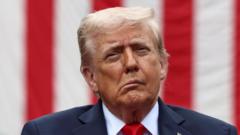Will Trump Impose Sanctions on Russia Over NATO's Oil Purchases?

Published: 2025-09-13 19:53:17 | Category: world
Former US President Donald Trump has suggested he is prepared to impose stricter sanctions on Russia, contingent upon NATO allies halting their purchases of Russian oil. This ultimatum reflects ongoing tensions between NATO and Russia amid the latter's invasion of Ukraine, as well as the broader geopolitical dynamics that influence energy dependence and military cooperation among member nations.
Last updated: 27 October 2023 (BST)
Key Takeaways
- Trump demands NATO countries stop buying Russian oil before imposing sanctions.
- The EU's reliance on Russian energy has significantly decreased since 2022.
- Ukraine's President calls for an end to any energy deals with Russia.
- Trump's sanctions proposal targets not only Russia but also China with potential tariffs.
- Turkey's relationship with Russia complicates NATO's efforts to unify on sanctions.
Trump's Position on NATO and Russia
In a recent post on his Truth Social platform, Trump reiterated his readiness to impose "major sanctions on Russia" but insists that NATO nations must first agree to halt their oil imports from the country. He has been vocal about the "shocking" nature of these purchases, which he believes undermines NATO's negotiating power with Moscow. "I am ready to 'go' when you are. Just say when?" Trump wrote, signalling his willingness to act if allies are onboard.
The Current Energy Landscape in Europe
Europe's dependence on Russian energy has been a critical factor in the ongoing conflict. In 2022, around 45% of the EU's gas supply came from Russia. However, this figure is projected to drop to about 13% in 2023, indicating a significant shift in policy and consumption patterns. Yet, Trump's insistence that the current level of energy purchases is unacceptable suggests he believes further action is necessary to strengthen NATO's position against Russia.
Energy Purchases and Ukraine's Call for Action
Ukrainian President Volodymyr Zelensky has echoed similar sentiments, urging European countries to cease all forms of energy transactions with Russia. In an interview with ABC News, he stated the urgency of stopping any deals with Russia, arguing that economic ties directly fund the ongoing military aggression against Ukraine. Since 2022, European nations have reportedly spent around €210 billion (£182 billion) on Russian oil and gas, which has raised concerns regarding the ethical implications of these financial transactions.
Potential Consequences of Sanctions
The implications of Trump's proposed sanctions could extend beyond Russia. He suggested that imposing tariffs of 50% to 100% on China could further diminish Moscow's influence, as China has maintained a close relationship with Russia throughout the conflict. This dual approach—targeting both Russia and its key allies—highlights the complex interdependencies in global trade and energy markets.
NATO's Response to Russian Aggression
Recent events, such as the incursion of Russian drones into Polish airspace, have heightened tensions between NATO allies and Russia. Poland reported this incident as deliberate, while Russia downplayed the matter. In response, NATO nations, including Denmark, France, and Germany, have begun reinforcing their eastern flank by moving military assets closer to areas of potential conflict, showcasing a unified front against Russian aggression.
Challenges in Unifying NATO's Stance
One of the key challenges in Trump’s proposal is the diverse energy needs and political relationships within NATO. Turkey, a significant buyer of Russian oil, has maintained a closer relationship with Moscow than other NATO members. Convincing Ankara to curtail its imports may prove difficult, as its energy strategy is intertwined with national interests and economic considerations.
Previous Sanctions and Their Impact
The US has previously implemented tariffs on goods from various countries, including a notable 50% tariff on Indian goods, which encompassed a 25% penalty for transactions involving Russia. Such measures are indicative of a broader strategy aimed at financially isolating Russia; however, the effectiveness of these sanctions largely depends on the collective participation of NATO member states.
What's Next for NATO and Russia?
As the situation continues to evolve, NATO's ability to present a united front and effectively respond to Russian aggression remains critical. The proposed sanctions by Trump could serve as a catalyst for discussions among member nations, focusing on energy independence and strategic military partnerships. However, the nuances of each nation's energy reliance and diplomatic relations will play a significant role in shaping future actions.
Conclusion
Trump’s statements highlight the complexities of international relations amid ongoing conflicts and energy dependencies. With European nations gradually reducing their reliance on Russian energy, the path forward will require coordinated efforts to address both economic and security challenges. The unfolding geopolitical landscape will likely influence NATO's strategy and its interactions with both Russia and China in the coming months. How NATO members respond to these pressures will be pivotal in determining the future of the alliance and the stability of the region.
FAQs
What sanctions is Trump proposing against Russia?
Trump has suggested that NATO nations must stop purchasing Russian oil before he imposes tougher sanctions on Russia, indicating that collective action is essential.
How much of Europe’s gas supply comes from Russia now?
In 2022, approximately 45% of the EU's gas was sourced from Russia, but this figure is expected to decrease to around 13% in 2023, reflecting a significant shift in energy policy.
What did Zelensky say regarding energy purchases from Russia?
Ukrainian President Zelensky urged European nations to halt all energy purchases from Russia, asserting that such transactions fund the ongoing conflict in Ukraine.
Why is Turkey's position significant in NATO's sanctions discussion?
Turkey is a major buyer of Russian oil and has maintained close relations with Moscow, making it a challenging country for NATO to persuade to cut off Russian energy supplies.
What impact have previous US tariffs had on Russia?
Previous US tariffs, such as those imposed on India, aimed to financially isolate Russia by penalising transactions that support its military activities in Ukraine.



